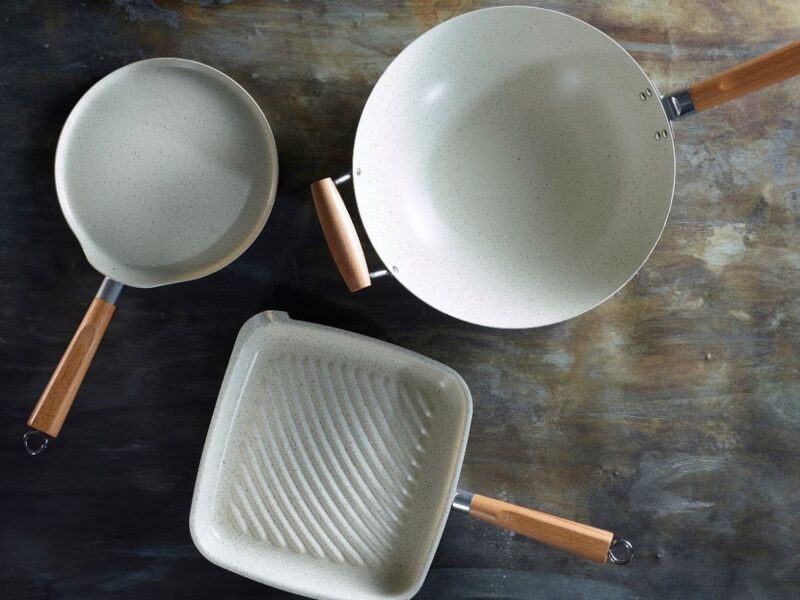Your kitchen is the place where you craft nutritious and filling meals that fuel you to live the best life you can. Obviously, you want your kitchen to be a safe, healthy space, but did you know that your kitchen might be harboring some unexpected toxins? The best way to ensure you keep your home and yourself safe from consuming harmful chemicals is by making an effort to create a non-toxic kitchen. From switching to non-stick ceramic pans to embracing organic recipes, we’re breaking down some easy ways to make your kitchen a non-toxic safe haven.
Switch to Ceramic Non-Stick Cookware
Non-stick cookware is great to have on hand, as it allows you to cook food quickly and efficiently without having to worry about any ingredients sticking to the pan itself. However, traditional Teflon cookware can contain harmful chemical compounds like polytetrafluoroethylene (PTFE). When Teflon cookware gets nicked or scratched thanks to common wear and tear, PTFE and other harmful toxins can make their way into the air and into your food. Consuming a side of chemicals with your dinner? Doesn’t sound fun!
“Non-stick cookware is great to have on hand, as it allows you to cook food quickly and efficiently without having to worry about any ingredients sticking to the pan itself. However, traditional Teflon cookware can contain harmful chemical compounds like polytetrafluoroethylene (PTFE).”
A great way to avoid the risk of toxins in your cookware is by switching to non-stick ceramic pans. Ceramic cookware is lined with a ceramic coating that naturally produces a non-stick effect with no chemicals. Ceramic cookware also tends to last longer than its metal counterparts. On top of that, ceramic non-stick cookware comes in a variety of styles and colors, so you can easily find the right cookware set to match your kitchen’s aesthetic. One thing to note about ceramic cookware is that it’s not dishwasher safe, so be sure to give your ceramic pans a gentle wash in the sink after use.
Choose Glass Over Plastic
For dishware, you’re going to want to choose glass over plastic items if you want to create a non-toxic kitchen. Plastic containers can contain harmful chemical components that can be easily released when exposed to high temperatures. On the other hand, glass products are safe at any temperature, so you can easily throw them in the microwave or dishwasher without worrying about toxins. Glass also is odor resistant, unlike plastic, which tends to absorb smells from the foods that are stored in them. So to avoid the risk of chemical compounds and to make cleaning easier, glass dishware, cups, and food storage containers are the way to go.
Opt for Natural Cleaning Products
You’ll also want to be mindful of the cleaning products you use in your kitchen. Many traditional household cleaners contain a variety of toxins that can be incredibly harmful to the body if consumed. In order to avoid the risk of harsh chemicals, use non-toxic, plant-based cleaning products to ensure you’re cleaning safely.

“In order to avoid the risk of harsh chemicals, use non-toxic, plant-based cleaning products to ensure you’re cleaning safely.”
If you have pets, it’s especially important to use non-toxic cleaning products, as dogs and cats can suffer severe health consequences from consuming the wrong chemicals. For dish and hand soaps, search for options that are free of fragrances; most fragranced products include chemicals that can cause allergic reactions.
Embrace Organic Ingredients
Another way to reduce the number of toxins in your kitchen is with the food you eat. By choosing to cook with organic ingredients, you’re ensuring that you and your family are eating the healthiest food that you can, free of harsh pesticides or chemical modification. Take a weekend trip to your local farmer’s market to find freshly grown produce, ethically sourced meat and fish, as well as loaves of bread, nut kinds of butter, and preserves. While organic produce can run on the higher side in terms of cost, it’s an investment that’s well worth it for your overall health.
Filter Away Impurities in Your Water
An unexpected source of toxins in your kitchen might be the water you’re drinking. If you’ve been grabbing a glass of water directly from the tap, think again: chemical impurities and harmful minerals like lead can easily make their way into the water supply.

In order to ensure that you’re drinking the cleanest water possible, you’ll want to filter your tap water. You can hook a filter up directly to your faucet for easy access, or if you prefer your water chilled, you can get a pitcher-style filter that fits in your fridge. Filter your water to sip safely and with the assurance that you’re not consuming any unwanted substances.
In Conclusion
Making an effort to reduce the toxins in your kitchen is an important part of maintaining your long-term health. To avoid ingesting harmful chemicals from cooking, opt for ceramic non-stick cookware that’s free of toxin-filled coating. Additionally, you can choose to replace plastic dishes and cups with glass ones for easy-to-clean, non-toxic serving ware. On top of this, you can invest in organic ingredients, plant-based cleaning products, and a good water filter. So what steps are you taking to create a non-toxic kitchen?






